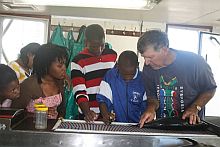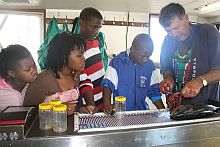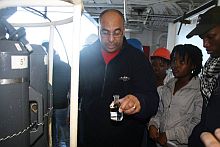St Helena Bay monitoring - a voyage of scientific discovery
|
The Environmental Science Education Outreach unit of SAEON’s Egagasini Node has been pursuing the objective of integrating ocean sciences into the school sciences curriculum since its inception.
SAEON’s mandate of long-term monitoring presents a unique opportunity for the integration of ocean sciences into school sciences. Ocean observation methods have proved to be an invaluable tool in assisting learners to gain a better understanding of the oceans and to acquire basic skills in marine sciences.
From ship-based scientific activities to oceanic robots profiling ocean properties, the opportunities are exceptional and the knowledge gained through these activities could essentially inform the school science curriculum and make its way into the classroom.
The Egagasini Node’s Argo programme presents an ideal opportunity for school-based monitoring as well as for adoption into school sciences. SAEON’s challenge is to make this programme a voyage of discovery for the learners and to expose them to marine sciences and the opportunity to acquire knowledge and skills exploring the ocean as an environment.
The idea of having learners participating in scientific observation on the open ocean seemed daunting at first. However, with support and encouragement from Marine and Coastal Management (MCM), the host organisation of the SAEON Egagasini Node, we were able to implement our plans.
On 18 February the FSR AFRICANA set sail with six learners from previously disadvantaged schools on board to participate in the monthly St Helena Bay monitoring line. This line, which has been running for almost 10 years, is a prime example of the importance of long-term monitoring in our oceans.
Learning by discovery
Dr Larry Hutchins, Chief Scientist on the cruise, was kind enough to spend time with the learners demonstrating how observations are conducted on board. Learning by discovery is arguably the best approach to learning and the scientific crew led the learners on a true voyage of discovery. They learnt more about research ships, how these ships operate and what it is like to live and work on board. The observation tools they used and data they collected helped them understand how scientists arrive at conclusions about the ocean as an environment.
I trust that the learners disembarked from the FSR AFRICANA with an understanding that the ocean as an environment is subject to ecological imperatives, and is a place of natural wonder and profound beauty. Many of the learners were so inspired that they will be setting up environmental groups in their schools.
SAEON is truly indebted to MCM, the ship’s crew and the marine scientists from MCM and the University of Cape Town (UCT) for supporting this pioneer programme. We hope this was the first of many cruises to influence the lives of young learners, foster a true appreciation for our marine science systems, and ignite a desire to understand them better.
What the learners had to say
In the words of Zizipho Kweyiya, a grade 11 learner from Usasazo High School in Khayelitsha: "I’ve always wanted to be a paediatrician until I was selected to attend this SAEON programme. Oceanography has been my second choice until my experience with this cruise. I am more certain that with good marks I now will register for Oceanographic studies at UCT in 2012."
"I did not expect somebody like me would get such an opportunity. I thought that people guessed the temperature, salinity...and how deep the ocean is..." Tasneem Isaacs, a Grade 11 learner from Ocean View High in Kommetjie





